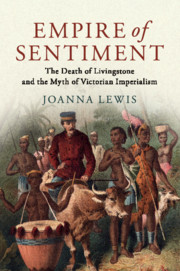Book contents
- Frontmatter
- Dedication
- Contents
- List of Figures
- List of Maps
- Acknowledgements
- Prologue: The Pathetic Death of Bwana Ingeleshi
- Introduction
- 1 ‘A Parliament of Philanthropy’: The Fight to Bury Livingstone
- 2 Laying to Rest a Victorian Myth: The ‘Lost Heart of the Nation’, Victorian Sentimentality & the Rebirth of Moral Imperialism
- 3 A Perfect Savagery: The Livingstone Martyrs & the Tree of Death on Africa's ‘Highway to Hell’
- 4 The Graveyard of Ambition: Missionary Wars, Bachelor Colonialism & White Memorials, Chitambo, 1900– 1913
- 5 White Settlers, Frontier Chic & Colonial Racism: How Livingstone's Three Cs Fell Apart
- 6 ‘The Hearts of Good Men’: 1973, the One- Party State & the Struggle against Apartheid
- 7 ‘Chains of Remembrance’: Livingstone, Sentimental Imperialism & Britain's Africa Conversation, 1913– 2013
- Conclusion
- Epilogue: The Testimony of Pastor Manduli
- Index
4 - The Graveyard of Ambition: Missionary Wars, Bachelor Colonialism & White Memorials, Chitambo, 1900– 1913
Published online by Cambridge University Press: 06 January 2018
- Frontmatter
- Dedication
- Contents
- List of Figures
- List of Maps
- Acknowledgements
- Prologue: The Pathetic Death of Bwana Ingeleshi
- Introduction
- 1 ‘A Parliament of Philanthropy’: The Fight to Bury Livingstone
- 2 Laying to Rest a Victorian Myth: The ‘Lost Heart of the Nation’, Victorian Sentimentality & the Rebirth of Moral Imperialism
- 3 A Perfect Savagery: The Livingstone Martyrs & the Tree of Death on Africa's ‘Highway to Hell’
- 4 The Graveyard of Ambition: Missionary Wars, Bachelor Colonialism & White Memorials, Chitambo, 1900– 1913
- 5 White Settlers, Frontier Chic & Colonial Racism: How Livingstone's Three Cs Fell Apart
- 6 ‘The Hearts of Good Men’: 1973, the One- Party State & the Struggle against Apartheid
- 7 ‘Chains of Remembrance’: Livingstone, Sentimental Imperialism & Britain's Africa Conversation, 1913– 2013
- Conclusion
- Epilogue: The Testimony of Pastor Manduli
- Index
Summary
But I would walk five hundred miles,
And I would walk five hundred more.
The Proclaimers, ‘I'm Gonna Be (500 miles)’, 1988Livingstone's grave at Chitambo now lay within a young territory called North-Eastern Rhodesia. Its neighbours included Barotzi-North Western Rhodesia, and British Central Africa (which would be renamed the Nyasaland Protectorate in 1907). A new era needed symbols and a useable past, especially when colonial rule was more aspiration than reality. This chapter tells the story of the politics of the memorialisation of Livingstone's grave around Chitambo and its relationship with the initial consolidation of what tried to pass itself off as a colonial state in this marginal region. Remote, unusual and unforgiving, this was an area where mostly working-class men and women tried to make a new life.
Alongside, Livingstone's fans in Britain attempted to control the design of a ‘fitting monument’ in central Africa to his memory and to humanitarian imperialism. What eventually transpired was, like colonial rule itself, far more limited. There was no room in this sentimental memorialising for Livingstone's African followers or their work as humanitarians. A memory and vision of white pioneering and sacrifice were taking shape. Nevertheless, despite shared racisms, the politics of the grave were tricky. Local peculiarities, missionary factionalism and practical limitations trimmed aspirations in these remote regions. Hard-pressed administrators, aware of how little whites could do, tried to contain expectations and the potential disruption from the steady trickle of new arrivals, some more welcome than others. The expansion of the railway brought tourists and single women travelling alone.
Livingstone's burial site radiated huge emotional resonance, which rippled out from the region far beyond. The site attracted lone bachelors seeking solitude or a quiet place to die. Livingstone's family also helped build up the emotional capital of the site by making very personal pilgrimages to the grave. This high-profile imperial family, with its dynastic humanitarian credentials, were a living link with Livingstone's high moral imperialism and a boon to metropolitan imperial propaganda. They were influential in shaping the conversation between Britain and Africa and in re-energising imperial humanitarianism for the next generation.
- Type
- Chapter
- Information
- Empire of SentimentThe Death of Livingstone and the Myth of Victorian Imperialism, pp. 127 - 159Publisher: Cambridge University PressPrint publication year: 2018



